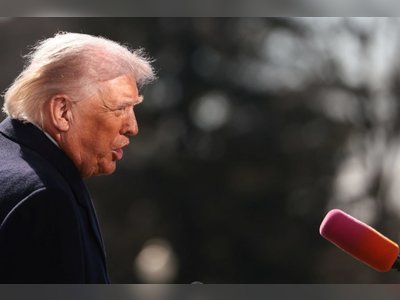White HouseSenateThe HouseSupreme CourtFederal ReserveDOJState DepartmentTreasuryCensusBudget OfficeTrade Representative
WashingTone
Informed by Washington, Defined by Insight
Monday, Mar 02, 2026
WashingTone

U.S. Intensifies Sanctions on Russian Energy Sector, Targeting Oil Producers and Shadow Fleet
The latest round of U.S. sanctions seeks to tighten the economic noose on Russia by targeting major oil companies, maritime vessels, and shadowy traders enabling the export of Russian oil despite international price caps.
In a major escalation of sanctions against Russia, the U.S. Department of the Treasury has announced sweeping new measures targeting the Russian energy sector.
These sanctions are part of a broader strategy to cut off revenue sources for Russia’s ongoing war efforts in Ukraine.
Specifically, today’s actions focus on the country’s key oil producers, illicit oil transportation networks, and opaque traders facilitating the sale of Russian oil above internationally imposed price caps.
A Direct Hit to Russia's Oil Industry
The centerpiece of the new sanctions is the targeting of two of Russia’s largest oil producers—Gazprom Neft and Surgutneftegas—both of which are responsible for a substantial portion of Russia’s oil production and exports.
Gazprom Neft, a vertically integrated company, engages in the exploration, production, and sale of oil, while Surgutneftegas operates similarly in the Russian energy landscape.
These companies are critical to Russia’s ability to fund its military operations in Ukraine, and by sanctioning them, the U.S. seeks to disrupt their operations.
The U.S. sanctions extend to over two dozen subsidiaries of these companies, effectively isolating them from the global financial system.
In addition to these direct sanctions, the U.S. is blocking the activities of maritime insurance providers—Ingosstrakh and AlfaStrakhovanie—which have enabled the shipment of Russian oil, further limiting Russia’s ability to trade its energy resources on the global market.
Cracking Down on Russia’s ‘Shadow Fleet’
A significant focus of today’s sanctions is on Russia’s maritime operations, particularly vessels involved in sanctionable activities.
The shadow fleet—consisting of vessels engaging in high-risk shipping practices and often flagged under jurisdictions designed to obscure ownership—has become a central tool for Russia’s oil exports.
This network of tankers and vessels has allowed Russia to circumvent price caps and export restrictions by delivering oil to countries willing to overlook the international sanctions.
The U.S. has sanctioned 183 vessels, including oil tankers and service ships, many of which are part of this shadow fleet.
These vessels, operating in secrecy, have facilitated the continued flow of Russian oil despite the efforts of the U.S. and its allies to reduce Russia’s revenue streams.
The sanctions target the ownership and operation of these vessels, thereby further isolating Russia’s oil export infrastructure.
Sanctioning Oilfield Service Providers and Traders
In addition to sanctioning oil producers and shipping companies, the U.S. is also targeting key oilfield service providers in Russia.
These companies provide vital technical expertise and equipment for Russia’s oil extraction activities, particularly in hard-to-reach reserves.
The sanctions aim to disrupt these critical operations and further hinder Russia’s ability to maintain its oil production capabilities.
Moreover, opaque traders involved in the sale of Russian oil have also been sanctioned.
These traders, often registered in jurisdictions with lax regulations, have been instrumental in facilitating the continued movement of Russian oil, including shipments above the $60 price cap imposed by the U.S. and its allies.
By targeting these traders, the U.S. hopes to stifle the flow of illicit oil and raise the risks associated with engaging in such activities.
International Cooperation: The UK Joins the Effort
In a coordinated effort, the United Kingdom has joined the U.S. in sanctioning Gazprom Neft and Surgutneftegas.
This collaboration between the U.S. and the UK represents a unified stance against Russia’s exploitation of its energy sector to fund its war.
The partnership underscores the growing international consensus that Russia’s energy exports must be curtailed in order to weaken its economic base and limit its ability to finance military aggression.
The Economic and Geopolitical Impact
These sanctions are poised to have significant economic and geopolitical consequences.
For Russia, the sanctions aim to diminish its oil exports, which are the lifeblood of its economy.
Oil and gas exports account for a large portion of Russia’s federal budget, and cutting off access to global markets is expected to create substantial fiscal pressure.
However, these measures may also strain global oil markets, particularly for countries heavily reliant on Russian energy supplies.
The sanctions are likely to push Russia to find alternative markets for its oil, potentially deepening its ties with non-Western countries, including China and India, which have continued to buy Russian oil despite the sanctions.
While Russia’s oil may find new buyers, the sanctions aim to increase the costs of these transactions and undermine the stability of Russia’s energy sector.
Shadow Fleet Risks and Global Oversight
The targeting of the shadow fleet signals a significant shift in how the U.S. and its allies are approaching the enforcement of sanctions.
The use of shadow fleets to circumvent sanctions has been a growing concern for international regulators.
Today’s actions send a clear message that the U.S. is prepared to go after these maritime operations with greater force.
The implications of these sanctions are not just limited to Russia.
They send a strong signal to other countries and companies that continue to engage with Russia’s energy sector, warning that they may face increased risks of sanctions.
For global trade, this means a tightening of the regulatory environment and greater scrutiny of vessels and companies involved in the transportation and trading of Russian oil.
Looking Ahead: The Long-Term Strategy
The new sanctions are part of a broader, long-term strategy to weaken Russia’s ability to sustain its military operations through energy revenues.
By cutting off Russia’s access to critical oilfield services, shipping routes, and international markets, the U.S. aims to slow the country’s oil production and exports.
However, it remains to be seen how effectively these sanctions will impact Russia’s energy capabilities in the long run.
The sanctions are unlikely to lead to an immediate collapse of Russia’s oil industry, but they may have a significant cumulative effect over time.
As the shadow fleet becomes less viable and Russia’s oil revenues dwindle, the country may be forced to reconsider its military ambitions or find alternative means of financing its war effort.
The success of this strategy will depend not only on continued U.S. enforcement but also on global cooperation.
With many countries still dependent on Russian energy, ensuring that international sanctions are respected will be a key challenge for the U.S. and its allies.
Conclusion: A Strategic Escalation in the Sanctions Campaign
The U.S. Treasury’s decision to target Russia’s key oil producers, maritime networks, and oilfield services is a strategic escalation in the sanctions campaign aimed at undermining Russia’s ability to fund its war against Ukraine.
These measures reflect a growing commitment by Western nations to use economic pressure as a tool to achieve geopolitical goals.
While the sanctions may not bring an immediate halt to Russia’s military activities, they represent a concerted effort to increase the financial and logistical difficulties of sustaining such operations.
As the sanctions campaign intensifies, the international community will be closely watching to see if these actions bring Russia to the negotiating table or further entrench its defiance.
These sanctions are part of a broader strategy to cut off revenue sources for Russia’s ongoing war efforts in Ukraine.
Specifically, today’s actions focus on the country’s key oil producers, illicit oil transportation networks, and opaque traders facilitating the sale of Russian oil above internationally imposed price caps.
A Direct Hit to Russia's Oil Industry
The centerpiece of the new sanctions is the targeting of two of Russia’s largest oil producers—Gazprom Neft and Surgutneftegas—both of which are responsible for a substantial portion of Russia’s oil production and exports.
Gazprom Neft, a vertically integrated company, engages in the exploration, production, and sale of oil, while Surgutneftegas operates similarly in the Russian energy landscape.
These companies are critical to Russia’s ability to fund its military operations in Ukraine, and by sanctioning them, the U.S. seeks to disrupt their operations.
The U.S. sanctions extend to over two dozen subsidiaries of these companies, effectively isolating them from the global financial system.
In addition to these direct sanctions, the U.S. is blocking the activities of maritime insurance providers—Ingosstrakh and AlfaStrakhovanie—which have enabled the shipment of Russian oil, further limiting Russia’s ability to trade its energy resources on the global market.
Cracking Down on Russia’s ‘Shadow Fleet’
A significant focus of today’s sanctions is on Russia’s maritime operations, particularly vessels involved in sanctionable activities.
The shadow fleet—consisting of vessels engaging in high-risk shipping practices and often flagged under jurisdictions designed to obscure ownership—has become a central tool for Russia’s oil exports.
This network of tankers and vessels has allowed Russia to circumvent price caps and export restrictions by delivering oil to countries willing to overlook the international sanctions.
The U.S. has sanctioned 183 vessels, including oil tankers and service ships, many of which are part of this shadow fleet.
These vessels, operating in secrecy, have facilitated the continued flow of Russian oil despite the efforts of the U.S. and its allies to reduce Russia’s revenue streams.
The sanctions target the ownership and operation of these vessels, thereby further isolating Russia’s oil export infrastructure.
Sanctioning Oilfield Service Providers and Traders
In addition to sanctioning oil producers and shipping companies, the U.S. is also targeting key oilfield service providers in Russia.
These companies provide vital technical expertise and equipment for Russia’s oil extraction activities, particularly in hard-to-reach reserves.
The sanctions aim to disrupt these critical operations and further hinder Russia’s ability to maintain its oil production capabilities.
Moreover, opaque traders involved in the sale of Russian oil have also been sanctioned.
These traders, often registered in jurisdictions with lax regulations, have been instrumental in facilitating the continued movement of Russian oil, including shipments above the $60 price cap imposed by the U.S. and its allies.
By targeting these traders, the U.S. hopes to stifle the flow of illicit oil and raise the risks associated with engaging in such activities.
International Cooperation: The UK Joins the Effort
In a coordinated effort, the United Kingdom has joined the U.S. in sanctioning Gazprom Neft and Surgutneftegas.
This collaboration between the U.S. and the UK represents a unified stance against Russia’s exploitation of its energy sector to fund its war.
The partnership underscores the growing international consensus that Russia’s energy exports must be curtailed in order to weaken its economic base and limit its ability to finance military aggression.
The Economic and Geopolitical Impact
These sanctions are poised to have significant economic and geopolitical consequences.
For Russia, the sanctions aim to diminish its oil exports, which are the lifeblood of its economy.
Oil and gas exports account for a large portion of Russia’s federal budget, and cutting off access to global markets is expected to create substantial fiscal pressure.
However, these measures may also strain global oil markets, particularly for countries heavily reliant on Russian energy supplies.
The sanctions are likely to push Russia to find alternative markets for its oil, potentially deepening its ties with non-Western countries, including China and India, which have continued to buy Russian oil despite the sanctions.
While Russia’s oil may find new buyers, the sanctions aim to increase the costs of these transactions and undermine the stability of Russia’s energy sector.
Shadow Fleet Risks and Global Oversight
The targeting of the shadow fleet signals a significant shift in how the U.S. and its allies are approaching the enforcement of sanctions.
The use of shadow fleets to circumvent sanctions has been a growing concern for international regulators.
Today’s actions send a clear message that the U.S. is prepared to go after these maritime operations with greater force.
The implications of these sanctions are not just limited to Russia.
They send a strong signal to other countries and companies that continue to engage with Russia’s energy sector, warning that they may face increased risks of sanctions.
For global trade, this means a tightening of the regulatory environment and greater scrutiny of vessels and companies involved in the transportation and trading of Russian oil.
Looking Ahead: The Long-Term Strategy
The new sanctions are part of a broader, long-term strategy to weaken Russia’s ability to sustain its military operations through energy revenues.
By cutting off Russia’s access to critical oilfield services, shipping routes, and international markets, the U.S. aims to slow the country’s oil production and exports.
However, it remains to be seen how effectively these sanctions will impact Russia’s energy capabilities in the long run.
The sanctions are unlikely to lead to an immediate collapse of Russia’s oil industry, but they may have a significant cumulative effect over time.
As the shadow fleet becomes less viable and Russia’s oil revenues dwindle, the country may be forced to reconsider its military ambitions or find alternative means of financing its war effort.
The success of this strategy will depend not only on continued U.S. enforcement but also on global cooperation.
With many countries still dependent on Russian energy, ensuring that international sanctions are respected will be a key challenge for the U.S. and its allies.
Conclusion: A Strategic Escalation in the Sanctions Campaign
The U.S. Treasury’s decision to target Russia’s key oil producers, maritime networks, and oilfield services is a strategic escalation in the sanctions campaign aimed at undermining Russia’s ability to fund its war against Ukraine.
These measures reflect a growing commitment by Western nations to use economic pressure as a tool to achieve geopolitical goals.
While the sanctions may not bring an immediate halt to Russia’s military activities, they represent a concerted effort to increase the financial and logistical difficulties of sustaining such operations.
As the sanctions campaign intensifies, the international community will be closely watching to see if these actions bring Russia to the negotiating table or further entrench its defiance.











